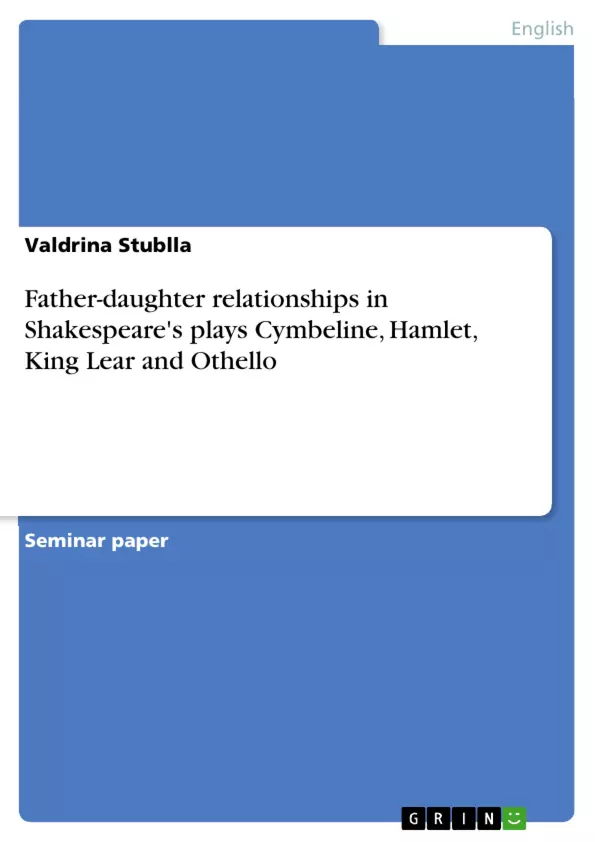The relationship between fathers and daughters is a powerful source of Shakespeare’s plays, which he chose to explore in great depth. By focussing on Shakespeare’s dramas "Cymbeline", "Hamlet", "King Lear" and "Othello", I will try to examine the complex and provocative relationship between fathers and daughters.
These literary works provide four different father-daughter relationships between Cymbeline and Innogen, Polonius and Ophelia, King Lear and Cordelia and Brabantio and Desdemona. The plays have in common that they take up the stories at the point at which the daughter is moving out of the sphere of her father’s control and starts to become independent.
The topic will be introduced by considering the historical background, which will help understand the situation of women at Shakespeare’s times and the cultural dimension of the relationship a woman had to her father. Following this, on the basis of Shakespeare’s dramas I will explore the challenges that daughters had to face by considering the fathers’ responses to transitions in her life like marriage. How do daughters handle the situation of leaving their fathers for the commitment of marriage and filial obedience? Are the fathers ready to release their daughters into adulthood?
Inhaltsverzeichnis (Table of Contents)
- Introduction
- Elizabethan Society as a Patriarchal Society
- The Renaissance Background
- Parents and children in this period of time
- Family Relationships in Shakespeare's plays
- The reactionary father in Cymbeline and Othello
- The egocentric father in King Lear
- The mercenary father in Hamlet
- The jealous father in Hamlet and Othello
- Conclusion
Zielsetzung und Themenschwerpunkte (Objectives and Key Themes)
This seminar paper aims to explore the complex and provocative relationship between fathers and daughters in Shakespeare's plays, specifically focusing on Cymbeline, Hamlet, King Lear, and Othello. The paper examines the challenges faced by daughters in transitioning from childhood to adulthood, analyzing the fathers' responses to this transition and exploring themes of societal expectations, patriarchal authority, and the tension between filial obedience and individual freedom.
- The impact of patriarchal society on father-daughter relationships
- The complexities of parental authority and its limitations
- The struggle for daughters' emotional independence and freedom of choice
- The role of marriage as a point of transition and tension within the family
- The influence of historical and cultural context on the portrayal of father-daughter dynamics
Zusammenfassung der Kapitel (Chapter Summaries)
- Introduction: This chapter establishes the context for the paper, emphasizing the importance of the father-daughter relationship in Shakespeare's plays and outlining the key themes that will be explored. The chapter argues that Shakespeare uses these relationships to highlight the tensions of transition within the family, particularly regarding the daughters' need for emotional independence and the fathers' struggle to relinquish control.
- Elizabethan Society as a Patriarchal Society: This chapter provides a historical backdrop to the paper, discussing the prevailing societal norms and expectations of Elizabethan England. The chapter emphasizes the patriarchal nature of the era, where women were considered the weaker sex and subject to male authority. It explores the societal expectations of obedience and submission, particularly for women within the family structure.
- Family Relationships in Shakespeare's plays: This chapter focuses on analyzing the father-daughter relationships depicted in Shakespeare's plays, specifically focusing on Cymbeline, Hamlet, King Lear, and Othello. It examines the different types of fathers and their interactions with their daughters, highlighting the challenges faced by daughters and the contrasting responses of the fathers.
Schlüsselwörter (Keywords)
The paper focuses on analyzing the complex dynamics of father-daughter relationships in Shakespeare's plays. Key terms include: patriarchal society, Elizabethan era, filial obedience, emotional independence, transition to adulthood, marital expectations, parental authority, and the influence of historical and cultural context.
Frequently Asked Questions
Which Shakespeare plays are analyzed in this paper?
The paper focuses on "Cymbeline", "Hamlet", "King Lear", and "Othello".
How is Elizabethan society characterized in the context of family?
It is described as a patriarchal society where women were subject to male authority and high expectations of filial obedience.
What are the common themes in these father-daughter relationships?
Common themes include the daughter's move toward independence, the father's struggle to relinquish control, and the tension surrounding marriage.
How do the fathers react to their daughters' transitions?
The paper categorizes them as reactionary (Cymbeline, Brabantio), egocentric (Lear), mercenary (Polonius), or jealous.
What challenge do daughters like Ophelia or Desdemona face?
They must navigate the conflict between their duty to their fathers and their own desires for emotional independence and romantic commitment.
- Arbeit zitieren
- Valdrina Stublla (Autor:in), 2019, Father-daughter relationships in Shakespeare's plays Cymbeline, Hamlet, King Lear and Othello, München, GRIN Verlag, https://www.grin.com/document/465996



